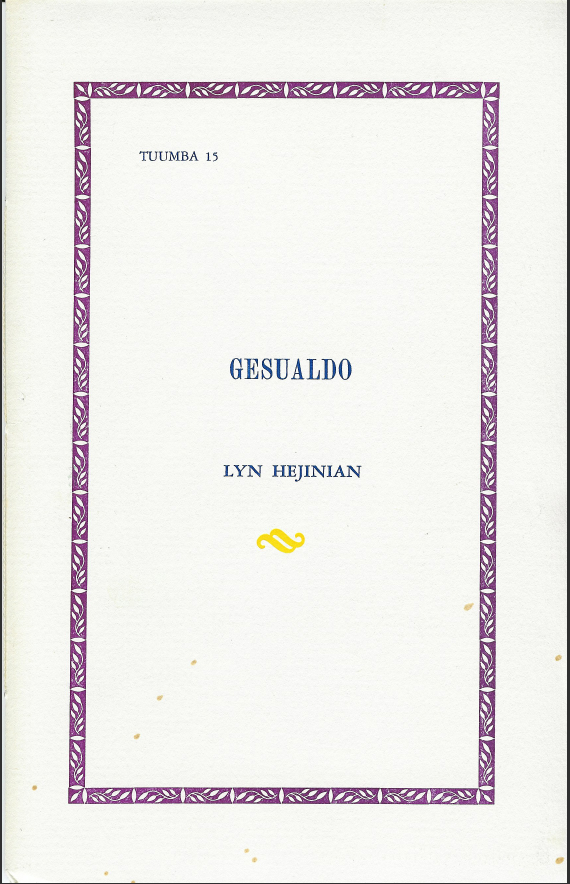I was at college one summer, stuck with work-study as my only income which meant I couldn’t really do anything and had nowhere air-conditioned to go but the library. The dorm I lived in felt like a stuffy tomb, so every hour that the library was open, I sat there. I took refuge in the library for three months, working my way through the poetry section, reading one slim volume after another and looking out the windows at the heat waving off the asphalt outside. At an intermediary stage of being a younger poet, I sought out experimental women writers obsessively, looking for women’s voices to break open the world. There was an area of the poetry section with one particularly vital constellation of such writers, where I found Lyn Hejinian’s The Cold of Poetry, which contained her 1978 poem “Gesualdo.” It was not the first poem I loved but it was one which reshaped the foundations of what I thought poetry could be—abstract elliptical essay, sensuous discourse on aesthetic form, history, and a strange kind of oblique confession all woven together into a sprawling imagistic song.
“Gesualdo” meditates on the music and life of the late Renaissance composer Carlo Gesualdo, who was known for the beauty of his madrigals, secular songs for several voices sung in contrapuntal arrangements without instrumentation. Gesualdo is also infamous for having murdered his wife and her lover, with the composer having become, over the centuries, a stand-in for aristocratic depravity. In the poem, Hejinian considers the exquisite pain in Gesualdo’s songs in contrast to the violence of his actions, “Some time the remainder a master of expression / which has given history complexity in / advance. Yet in this / lies the true. Gesualdo is / famous and a lover. In that year remarkable he / had proved himself in musical style of anything / achieved. It was hard to resist the harsh thrill- / ing pleasure, the greedy harmonies and dissonance, filling the ordinary.” Gesualdo the monster and Gesualdo the master stand side by side, reconciled in the beauty of the music and completely irreconcilable. Throughout the poem, the act of creation is edged with violence and the poet asks for no moral judgments of the reader.
The poem, composed of different sentences blocked together into prose fragments, mimics the different voices in Gesualdo’s madrigals. Each sentence is a little fragment of a thought or idea next to another little fragment, and together they build into a discontinuous chorus. Hejinian’s writing here is so abstract: it breaks your brain if you try to follow any one narrative or argumentative thread because these threads dissolve themselves even as they announce their own presence. In one such line Hejinian writes, “Because of them basically fragmented / could have believed not a frivolous which softened the see- / ming, one worthy raised of you to need. Necess- / ity was raised.”
As I write this now, I think about how odd it was to become so fixated at nineteen on a poem about a murderous aristocrat as a master of artistic creation, and how I might read the poem differently today if encountering it for the first time. But the baroque magnetism of the poem still remains and I would not renounce it, still. I think this is because Hejinian poses a certain kind of feminist critical practice in “Gesualdo” that never turns away from the story’s ugliness nor from its beauty, as the two are so intertwined. This is a kind of critical/creative practice that I continue to aspire to, no longer being a young writer–a clarity of vision refracted through the extreme moral and aesthetic difficulty of the world. Hejinian performs an unusual kind of ekphrasis here. If ekphrasis traditionally spins a poem out from a work of visual art, the ekphrastic move in “Gesualdo” is to treat all of history and life as a point of departure for ekphrastic improvisation. In this way, the poem is not apart from the reader, but moves through her as some kind of unsettling synesthetic experience. The ethereal sound of Gesualdo’s madrigals are transmuted into bits of language and image that form a somewhat inscrutable critical text that delivers pleasure upon pleasure, “ardor alternates, love into mourning and ecstasy / into flight.” Years on, “Gesualdo” is the distorted baroque mirror to which I return to gaze again and again.




